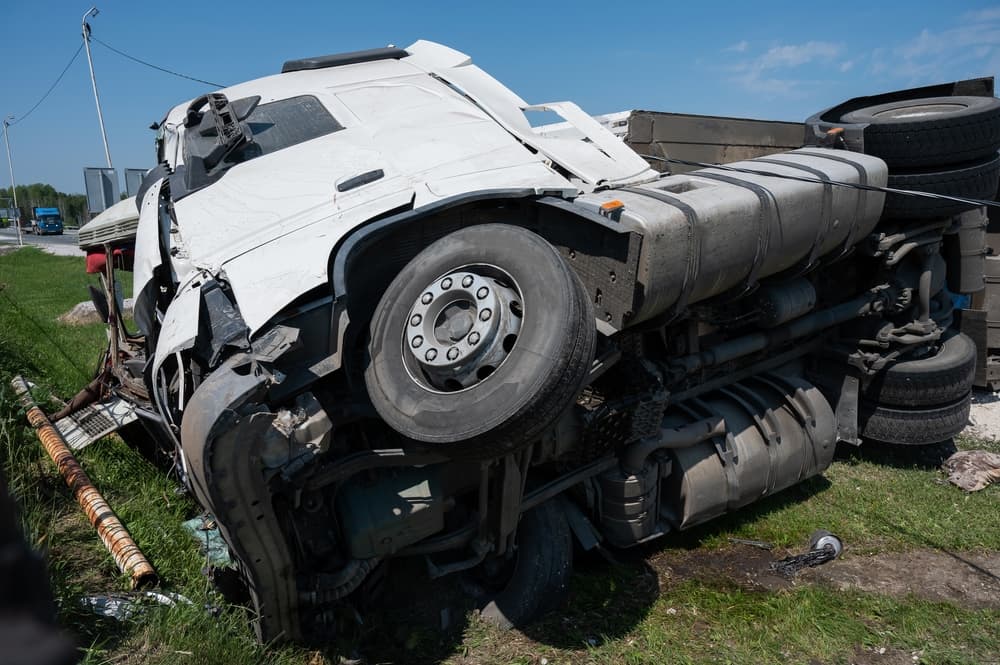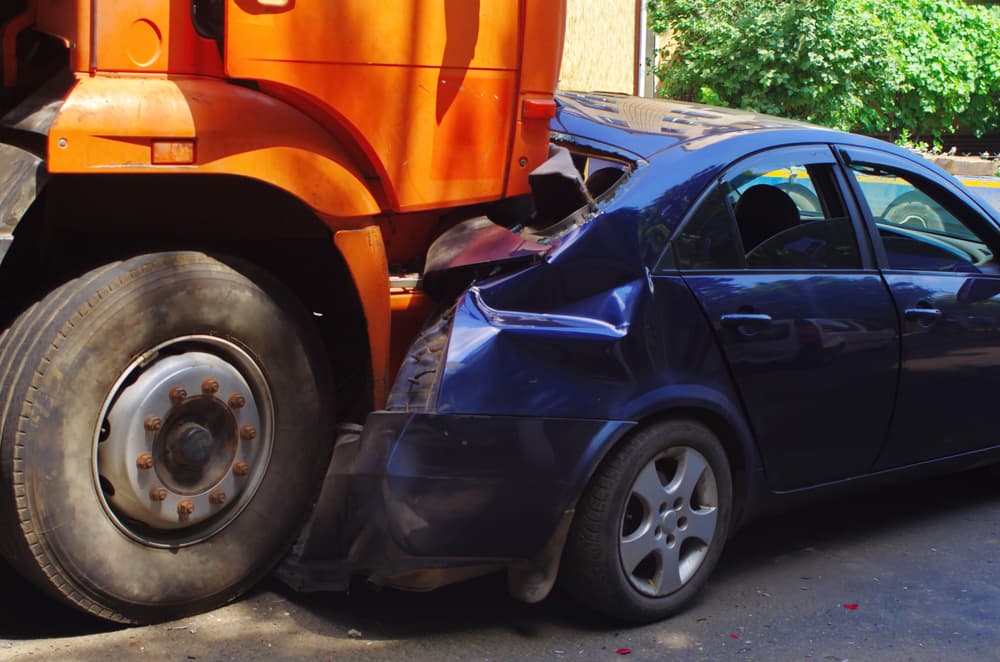When truck drivers and the trucking companies that employ them are negligent, serious accidents may happen, which leave others with severe injuries and pain.
Truck drivers usually behave negligently when they violate standard road rules or motor carrier regulations.
Trucking companies, on the other hand, are sometimes negligent when they fail to adequately supervise their drivers, or they entrust one of their vehicles to a driver with a poor driving record.
If you recently sustained injuries in a truck crash, involve an Edmonton truck accident lawyer in your case right away. Your lawyer can retain an accident reconstructionist to investigate your accident’s circumstances. They can then file a claim with the negligent truck driver or trucking company’s insurer.
After filing a claim, your lawyer can represent you during all settlement negotiations and pursue the favourable monetary award you deserve to recover for your injuries.
Alternatively, if the insurance company does not make you a fair settlement offer, your lawyer may file a lawsuit on your behalf in the court system and litigate your case to an efficient resolution.
Every step of the way, you can rest assured that your lawyer will aggressively fight for your legal interests and pursue the maximum amount of monetary compensation you deserve to recover.
Your lawyer can also answer all your questions, address all your concerns, and provide you with the necessary information to make intelligent decisions throughout your case.
GET YOUR FREE CONSULTATION NOW!
Reasons Truck Accidents Happen

One of the most common reasons truck accidents happen is truck driver negligence. Truck driver negligence can take several different forms, but it usually occurs when drivers violate traffic laws, such as driving while distracted or under the influence of alcohol.
One of the most common causes of truck accidents is road-rule violations. When truck drivers fail to follow standard road rules, they significantly increase the chances of bringing about a collision, which leads to injuries.
Some of the most common moving violations that negligent truck drivers commit include:
- Failing to yield the right-of-way to other traffic at the appropriate times
- Excessive speeding
- Failing to use turn signals
- Failing to regularly check their side view mirrors while driving and pulling out of parking spaces
In addition to road-rule violations, truck drivers may cause serious accidents when they drive while under the influence of alcohol or drugs. Most passenger vehicle operators are legally intoxicated if their blood alcohol concentration, or BAC, meets or exceeds 0.08 percent.
However, a commercial vehicle operator, including a tractor-trailer driver, is legally intoxicated if Breathalyzer or chemical evidence reveals any amount of alcohol or drugs in their system while driving. If a truck driver incurs a criminal conviction on a DUI charge, they will face severe criminal, civil, and administrative penalties.
Moreover, if they cause a traffic accident that leads to a driver’s or passenger’s injuries, they may have to pay monetary compensation to the accident victim through their insurance company.
When people drive while intoxicated, they are far more likely than sober drivers to cause serious accidents. Drunk and drugged drivers frequently experience very debilitating symptoms, including impaired vision, delayed reaction time, poor muscular coordination, impaired judgment, delayed reflexes, and the inability to accurately judge distances between vehicles.
Given these severe impairments, drunk drivers are frequently unable to drive safely and carefully.
A truck accident may also occur when a truck driver is reckless.
To pass traffic quickly and arrive at their final destination ahead of schedule, a truck driver may resort to excessive speeding, tailgating other vehicles, weaving around heavy traffic, and cutting off cars in traffic. A reckless driver may also attempt to pass slower-moving vehicles in a no-passing zone, bringing about a head-on collision with an oncoming vehicle.
Truck accidents may also happen when truck drivers and trucking company employees violate state and federal motor carrier regulations. These regulations ensure safe truck operation and provide guidelines for weight limits, loading and unloading procedures, and securing cargo to a trailer properly.
When truck drivers and trucking company employees routinely violate these regulations, loose cargo may fall off a trailer and land in the middle of the road, bringing about multiple collisions with other vehicles.
Additionally, if a trucking company employee fails to properly load cargo onto a trailer, the truck may become imbalanced while in motion, leading to a full or partial overturn accident.
In addition, truck accidents may occur when drivers become fatigued while on the road. Trucking companies often offer truck drivers significant financial incentives to drive fast and deliver their cargo ahead of schedule. Therefore, many truck drivers will drive for hours and not stop for rest breaks or naps. Consequently, they often become very tired while driving their trucks.
If a truck driver falls utterly asleep at the wheel, they will almost always lose control of their truck, potentially bringing about a collision with multiple vehicles. Even if drivers remain awake, their concentration and focus may become extremely limited, increasing their chances of causing an accident.
Finally, some truck accidents happen because of distracted or careless truck drivers.
Instead of paying attention to the road and regularly checking their mirrors while driving, a distracted truck driver might be using a cellular phone that is not equipped with Bluetooth, texting and driving, listening to loud music, or programming a GPS navigation device in the cab of their truck.
Any time a driver takes their eyes off the road, even briefly, they may lose focus, negligently bringing about a severe collision with another vehicle or pedestrian.
If you suffered injuries in a truck accident that a negligent truck driver or trucking company brought about, you should consult a knowledgeable truck accident lawyer near you right away about your potential legal options.
Your lawyer can promptly investigate your accident circumstances, file a claim with the appropriate insurance company, and begin negotiating the fair compensation you need for your accident-related losses.
Truck Accident Categories
When truck drivers and trucking companies behave in a negligent, reckless, or careless manner, serious truck accidents can result, which lead to debilitating injuries and medical complications.
The type of truck accident that ultimately occurs will depend upon several factors, including the extent of the truck driver’s negligence, the area and roadway where the truck driver is travelling, and the geographical layout of the area, including the route and the number of travel lanes.
One type of truck accident is a truck rollover accident. These accidents frequently occur on busy highways when a truck driver or trucking company employee fails to properly load or secure cargo onto the truck bed. As a result, the truck may entirely or partially overturn in the middle of the roadway.
Another common type of truck accident is a sideswipe accident, where the side of a large truck or a tractor-trailer brushes against the side of another vehicle in an adjacent travel lane.
Head-on collisions happen when the front of a truck strikes the front of an oncoming vehicle in an opposing travel lane. These accidents are common when overly aggressive truck drivers pass slower-moving vehicles in a no-passing zone.
A rear-end, or tailgate accident, happens when the front of a truck strikes the back of another vehicle. These accidents typically occur when a truck driver speeds or does not leave sufficient stopping distance between the front of their vehicle and the rear of another car.
T-bone or broadside accidents frequently happen in traffic intersections when a truck driver tries to beat a red light or fails to stop at a stop sign. In this accident scenario, the front of a large truck strikes the side of a vehicle travelling on an intersecting road.
Finally, a truck jackknife accident happens when the tractor and trailer portions of a large truck fold inward, resembling a jackknife, impacting numerous other vehicles, especially when the tractor-trailer skids down a steep hill.
A knowledgeable truck accident lawyer near you can investigate the circumstances of your accident thoroughly and determine all potentially responsible individuals and entities.
Your lawyer can then name those parties in any claim or lawsuit that they file on your behalf. After filing a claim with the appropriate insurance company, your lawyer can handle all settlement negotiations for you and begin fielding settlement offers to successfully resolve your case.
Who Has the Legal Burden of Proof in a Truck Accident Case?
The injured accident victim has the legal burden of proof to recover monetary compensation in a truck accident claim or lawsuit. The responsible truck driver or trucking company does not need to prove anything in the case. Instead, the entire legal burden rests with the accident victim, the plaintiff in the case.

First, the injured truck accident victim must establish that the truck driver or trucking company owed them a legal duty of care.
Specifically, truck drivers have an obligation to follow standard traffic laws and all applicable state and federal motor carrier regulations. Trucking companies are responsible for following all rules and employing only safe and careful drivers.
Next, the truck accident victim must establish that the at-fault individual or entity violated or breached their legal duty of care.
For example, a truck driver might have violated one or more road rules by speeding, passing another vehicle in a no-passing zone, or operating a vehicle while under the influence of alcohol or drugs. Similarly, a trucking company may have entrusted one of their vehicles to a truck driver with a prior record of moving violations or DUIs.
Additionally, the truck accident victim must establish that the accident occurred as a direct result of the truck driver’s or trucking company’s negligent actions. Finally, they must demonstrate that as a direct and foreseeable result of the truck accident, they suffered one or more physical injuries.
A truck accident lawyer in your area can ensure that your case satisfies the legal burden of proof and can retain one or more experts who can testify in your case. These experts may include certified accident reconstructionists or medical experts, such as treating healthcare providers or medical specialists.
Recovering Monetary Damages in a Truck Accident Case
Victims of severe truck accidents frequently suffer debilitating medical complications that may affect them for years to come. They may also need to take time off work to recover from their injuries or switch jobs (and accept a lower pay rate) due to their injuries.
A skilled truck accident lawyer can help maximize the monetary damages you receive through a favourable insurance company settlement offer court judgement. In addition to recovering financial compensation for loss of income or earning capacity, a truck accident victim may pursue monetary recovery for their intangible losses.
Those damages may compensate accident victims for:
- Permanent disfigurement or disability
- Loss of the ability to use a specific body part
- Lost quality of life
- Pain and suffering
- Mental distress
- Inconvenience
- Loss of spousal consortium and companionship
Your lawyer will evaluate the strength of your case and decide the likely compensation you may receive through settlement or litigation. Your lawyer can also handle all settlement negotiations with insurance company representatives and represent you at all litigation proceedings in the court system.
Call an Experienced Truck Accident Lawyer Right Away
If you sustained injuries in a truck accident that a negligent trucking company or truck driver caused, always consult a skilled truck accident lawyer in your area immediately.

Accident victims must file a truck accident lawsuit within two years of their accident date. Otherwise, they cannot receive any monetary compensation for their accident-related losses. Therefore, quickly secure the legal representation you need after your truck accident.
A qualified Edmonton personal injury lawyer can begin acting on your behalf almost immediately.
First, your lawyer can gather necessary documentation, including medical records, police reports, video footage, and photographs. Your lawyer can then submit a settlement demand package to the insurance company and can set up and handle all negotiations for you.
If your case does not resolve then, your lawyer can file a personal injury lawsuit in court and bring your case to a favourable resolution.
